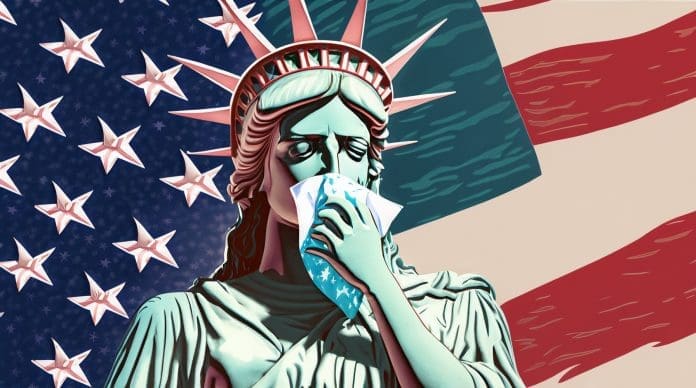There is a well-known saying in international finance: “When the United States sneezes, the world catches a cold”. For Ghana, this is not just a metaphor. Movements in the U.S. economy influence exchange rates, borrowing costs, export demand, and even the purchasing power of ordinary households in Accra. Understanding the rhythm of the U.S. economy has therefore been more than an academic exercise for me while I study at the University of Missouri. It is a survival strategy for myself, my team, and Maxwell Investments Group. My roles outside MIG also make this relevant to policymakers, businesses, entrepreneurs, and the broader Ghanaian citizenry.
This article is my first share of my takeaways from the Macroeconomics Theory classes. We will explore how the U.S. economy performed over the past year, using the key macroeconomic indicators economists rely on to assess growth, inflation, jobs, and trade. More importantly, we will connect those signals to Ghana’s own vulnerabilities and opportunities, showing why U.S. economic shifts are felt directly in our markets.
READING THE DASHBOARD: ECONOMIC INDICATORS EXPLAINED
Economic indicators are like dashboard lights in a car. They warn us of overheating, display our speed, and hint at what lies ahead.
- Leading indicatorsare forward signals. They change before the broader economy does. Examples include the yield curve, housing starts, stock prices, and the Purchasing Managers’ Index (PMI). A classic example is when the yield curve inverts (i.e. short-term interest rates rise above long-term rates). Historically, that has preceded U.S. recessions by several months.
- Lagging indicatorsare like the rear-view mirror. They only change after the economy has already shifted. Unemployment is the most well-known example; it typically increases after a recession has started. Other lagging signs include unit labour costs and consumer debt.
- Coincident indicatorsmove in real time with the economy. GDP, industrial production, and retail sales tell us what is happening right now in the present.
For Ghanaian readers, think of it like this: when traders at Makola Market cut back on stock orders, it acts as a leading indicator. When unemployment figures later rise, that is a lagging indicator. When cocoa export revenues appear in Bank of Ghana reports, that is a coincident indicator. Each type offers a different perspective on the same journey.
THE U.S. ECONOMY IN 2024–2025: A YEAR IN REVIEW
The past year for the U.S. economy has been a story of resilience after uncertainty. Here is what the data tells us:
GDP Growth
Real GDP, the broadest measure of output, contracted slightly in early 2025 but rebounded strongly in Q2 with 3.3% growth. The rebound came from resilient consumer spending and a reduction in imports. For Ghana, this matters because strong U.S. demand supports global commodity prices, including cocoa and gold.
Domestic Demand (Final Sales)
Private final sales measure U.S. household and business expenditure. It increased by 1.9% in Q2, indicating strong domestic confidence. For Ghana, this suggests a continued demand for imported consumer goods, but it also presents a challenge as U.S. spending patterns influence global shipping and supply chains.
Incomes (GDI)
Gross Domestic Income increased by 4.8% in Q2 2025. Rising wages and profits indicate strong household finances. This indirectly supports remittances sent to countries like Ghana, where U.S.-based diaspora communities are vital sources of household income.
Corporate Profits
Profits from current production increased by $65.5 billion in Q2 after a sharp decline in Q1. Stronger U.S. profits boost global investment flows, which can spill into African markets via ESG funds and emerging market portfolios.
Inflation and Prices
The price index for gross domestic purchases increased by just 1.8%. The Federal Reserve’s preferred measure, the PCE price index, remained steady at 2.0%, with core inflation at 2.5%. This stability reassures global investors. For Ghana, where imported inflation is a constant threat, U.S. price stability helps by alleviating global food and fuel cost pressures.
Labour Market
Unemployment remained between 4.0% and 4.2%. Nonfarm payroll growth slowed in mid-2025 but stayed positive. This indicates a labour market that is cooling, not collapsing. For Ghana, stable U.S. employment supports remittance flows and bolsters dollar strength.
Manufacturing PMI, or Manufacturing Purchasing Managers’ Index
The PMI increased from below 50, indicating contraction, to 53.3 by August 2025, signalling a manufacturing rebound. For Ghanaian exporters of raw materials and semi-finished goods, rising U.S. factory activity could lead to higher demand.
Exchange Rates
The U.S. dollar weakened slightly against the euro and the pound, but gained strength against the yen and the yuan. The overall dollar index fell modestly. For Ghana, this is significant. When the dollar weakens, the cedi experiences less pressure. However, when the dollar strengthens, the cost of imports increases, and inflationary effects are felt by consumers.
Interest Rates
The Federal Reserve kept the Fed Funds rate at 4.25%–4.50%. This cautious approach signals stability, but for Ghana, high U.S. interest rates can increase our borrowing costs and diminish investor appetite for riskier frontier-market debt.
WHY THIS MATTERS FOR GHANA
Each of these U.S. signals transmits to Ghana in concrete ways:
- Dollar strengthaffects fuel prices, import bills, and inflation in Ghana. A weak cedi against a strong dollar squeezes businesses and households alike.
- S. interest rates influence the rates Ghana must offer to attract international investors. When the Fed keeps interest rates high, Ghana’s Eurobond yields surge.
- S. consumption and manufacturing trendsshape demand for Ghanaian exports. Cocoa, gold, and crude oil all respond to global market sentiment.
- Corporate profits and investor flowsmatter because ESG and emerging market funds often take cues from U.S. financial cycles.
- Remittances from Ghanaians in the U.S. fluctuate in line with U.S. household income and employment conditions.
- Tourism and aid flowsare also affected. A strong U.S. economy tends to increase outbound tourism and philanthropy, while downturns tighten donations and aid budgets that Ghana depends on. The America-first stance of Trump’s administration might make this point moot.
- Technology and capital imports reflect U.S. investment cycles. When financing is cheap in the U.S., Ghanaian startups and infrastructure projects find it easier to raise funds.
The phrase ‘when the U.S. sneezes, Ghana catches a cold’ highlights this reliance. For an open, arguably import-dependent economy like Ghana, the U.S. economy functions almost like an external central bank whose signals influence our monetary and fiscal systems whether we like it or not.
LESSONS FOR GHANAIAN POLICYMAKERS AND BUSINESSES
- Monitor leading indicators, not just lagging ones.We wouldn’t want Ghana to react late to crises because policymakers focus on GDP and unemployment after the fact. Watching U.S. yield curves, PMI shifts, and housing starts can provide early warning signs.
- Bolster buffers against dollar fluctuations. The Bank of Ghana and the finance ministry must maintain healthy reserves and consider hedging strategies for essential imports such as fuel and fertiliser.
- Leverage remittances effectively. When U.S. incomes are high, remittances increase. Policymakers should facilitate directing these funds into productive investments rather than just consumption.
- Encourage businesses to plan on a global scale. Importers and exporters must recognise that U.S. cycles are not theoretical. They influence credit conditions, trade expenses, and currency pressures.
- Data innovation for informal markets. Just as U.S. investors explore new data sources, Ghana needs to find methods to capture informal market dynamics more swiftly. Prices in Kaneshie or Tamale often reflect a more accurate picture of inflation than official data released weeks later.
FOR NOW, THE COLD IS INEVITABLE.
The U.S. economy’s performance over the past year has demonstrated resilience, maintaining steady growth, moderate inflation, and cautious monetary policy. For Ghana, each of these signals is significant. From the strength of the dollar to the rate of U.S. job creation, America’s economic health is directly connected to Ghana’s stability.
The lesson is clear: Ghana cannot afford to ignore U.S. economic signals. Policymakers, businesses, and even households must keep an eye on America’s “dashboard lights,” because when the U.S. sneezes, Ghana really does catch a cold. It is, for the time being, inevitable. Yes, the inspiration for that line is Thanos.
I hope you found this article both insightful and enjoyable. Your feedback is greatly valued and appreciated. I welcome any suggestions for topics you would like me to cover or provide insights on. You can schedule a meeting with me through my Calendly at www.calendly.com/maxwellampong. Alternatively, connect with me through various channels on my Linktree page at www.linktr.ee/themax. Subscribe to the ‘Entrepreneur In You’newsletter here: https://lnkd.in/d-hgCVPy.
I wish you a highly productive and successful week ahead!
♕ —- ♕ —- ♕ —- ♕ —- ♕

The author, Dr. Maxwell Ampong, serves as the CEO of Maxwell Investments Group. He is also an Honorary Curator at the Ghana National Museum and the Official Business Advisor with Ghana’s largest agricultural trade union under Ghana’s Trade Union Congress (TUC). Founder of WellMax Inclusive Insurance and WellMax Micro-Credit, Dr. Ampong writes on relevant economic topics and provides general perspective pieces. ‘Entrepreneur In You’ operates under the auspices of the Africa School of Entrepreneurship, an initiative of Maxwell Investments Group.
Disclaimer: The views, thoughts, and opinions expressed in this article are solely those of the author, Dr. Maxwell Ampong, and do not necessarily reflect the official policy, position, or beliefs of Maxwell Investments Group or any of its affiliates. Any references to policy or regulation reflect the author’s interpretation and are not intended to represent the formal stance of Maxwell Investments Group. This content is provided for informational purposes only and does not constitute legal, financial, or investment advice. Readers should seek independent advice before making any decisions based on this material. Maxwell Investments Group assumes no responsibility or liability for any errors or omissions in the content or for any actions taken based on the information provided.
Source: newsghana.com.gh










